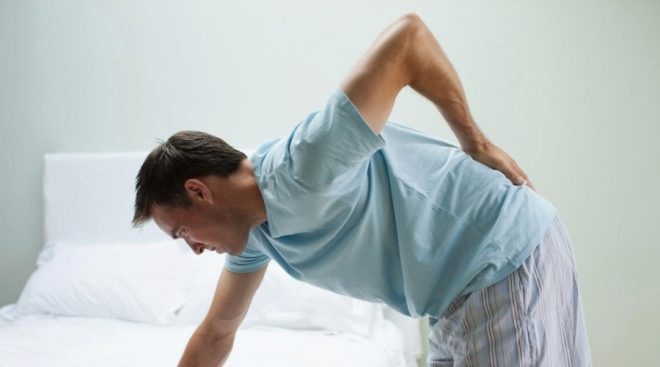Psychosomatics of muscle spasms in adults and children
Muscle cramps are very painful. This is known to all who have experienced them at least once. Official medical publications treat them as a stress disorder - in a healthy person, the muscle tissue is either elastic and relaxed or equally stressed when circumstances require it. A muscle spasm is a stretch of constant tension. In most cases, such cramps are of psychosomatic origin.
General information
Muscle spasm is often mistaken as seizures. Spasm is an involuntary muscle contraction, spasm is its constant tension with impaired blood circulation and severe pain.
It feels like aching or sharp pain. Spasms can occur in skeletal and smooth muscle tissue. Therefore, spasm can occur not only in the muscles of the body, limbs, but also in any internal organ.
There are not so many objective reasons for spasms - injuries, long static stress and stress. Up to 90% of all muscle spasms are allocated to the share of stress. It should be noted that appearing once, for example, in the neck, the spasm lasts for a lifetime.
If a person has to be in an uncomfortable position with a tense muscle for a long time, then the cells of the muscle tissue become accustomed to the condition and are already trying to maintain it further.
Why spasms are considered a typical psychosomatic illness, is easy to understand. When stress muscles come in tone. They receive such a signal from the brain, the tone is maintained by the corresponding hormonal background - adrenaline, cortisone, etc. When the stress subsides, the tension should also go away. But it often happens that a person is too long under stress or is under stress from within and doesn’t give himself a report on this, then chronic persistent spasm develops for psychogenic reasons.
Psychosomatic causes
The mere fact of having muscle spasm, from the point of view of psychosomatics, suggests that a person has a severe internal conflict, which is probably supported by external stresses. In other words, a person cannot come to terms with himself (desires are at odds with possibilities, duties with preferences, etc.), and here there are also conflicts at home, at work, troubles, financial problems. Muscles can not relax due to the state of stress running and supported by the body itself.
But more accurately establish the cause, to get rid of tension and pain, will help place the spasm.
Neck
Muscle spasm in this part of the body indicates that the person has excessive mental activity, he overloads himself, does not give himself either the opportunity to recover, or the chance to rest. The neck is blocked during a spasm, mobility is tripled, thus the body tries to limit the view - less seen from the sides - fewer thoughts from which the head is ready to explode. Often these cramps are accompanied by headaches.
Throat
A spasm in the throat zone indicates a person’s blocking of emotions. Critically impaired mechanisms of interaction with people or themselves. A spasm in the throat zone at the jugular notch often arises in situations where a person in front of him cannot confess something that he has done. Cramps in this area are an important warning.If a person does not accept it and does not change the order of communication with himself and people, does not become more open, then the development of diseases of the thyroid gland, diseases of the bronchi and lungs is possible.
Thorax (upper part)
This is a place of accumulation of offenses. Recall your sensations in a situation where you have experienced a terrible offense - in the upper part of the chest there appears a completely physical sensation of coma, tension with a chill spreading down the larynx and down the chest. In the people, these feelings are often called the “stone on the heart.”
Muscle tension in this zone actually affects the heart - the pericardium suffers.
If you do not identify the cause of psychosomatic spasm and do not eliminate it, then cardiac pathologies will not be avoided. Such people are easily recognizable by the characteristic expression of the face - lowered lips, offended and hunted look.
Thorax (center)
Zone of love and tender feelings. If muscle spasm occurs here, then the cause must be sought in your personal life, in the patient's heart experiences. Often, people who deliberately exclude love from their lives (for example, stopped believing in it and abandon the desire to love and be loved) suffer from such spasms. In the absence of love, emptiness fills the void within. In the overwhelming majority of cases, the real reason for the lack of love in such cases lies in the long-standing children's psychological trauma, in which the child concluded that the world does not love him, nobody needs him, love does not exist.
Diaphragm
Social and material fears and blocked emotions. Man can not express neither sorrow nor joy. It was as if he had received a blow from his life from the bottom of his breath and was frozen in that position. He rarely laughs, rarely smiles, he is calm. Often he himself has forbidden himself to express emotions, since the main desire of such patients is to keep everyone and everything under control. The requirement applies to himself.
Navel and near area
Here lives the human fear. A spasm in this part of the body is a signal that fear has reached its apogee. If nothing is done, a variety of diseases can appear - from tuberculosis to oncology. People with cramps in the umbilical zone are usually very timid and vulnerable, sometimes they do not know how to stand up for themselves.
Pelvis
Muscle cramps in the pelvis are an indication that a person is blocking sexuality. Even if there is a personal life, sex does not bring satisfaction and relaxation in it. Often combined with obesity, diseases of the pelvic organs.
Arms and legs
Spasms in the limbs - a signal that a person does something wrong (hands) or does not go there through life (legs). Often, such spasms suffer from people with a large internal conflict, which has developed because of the need to go to unloved work, to do what the soul does not lie.
Treatment
Elimination of spasms requires the obligatory assistance of a psychotherapist who is a psychosomatic specialist. Relaxing techniques, hypnotherapy, as well as swimming and adequate physical therapy will help to gain health.
However, it is necessary to adopt a new type of thinking - positive. Stop being afraid, open to the senses and learn to express them, accept yourself, forgive offenses.

















